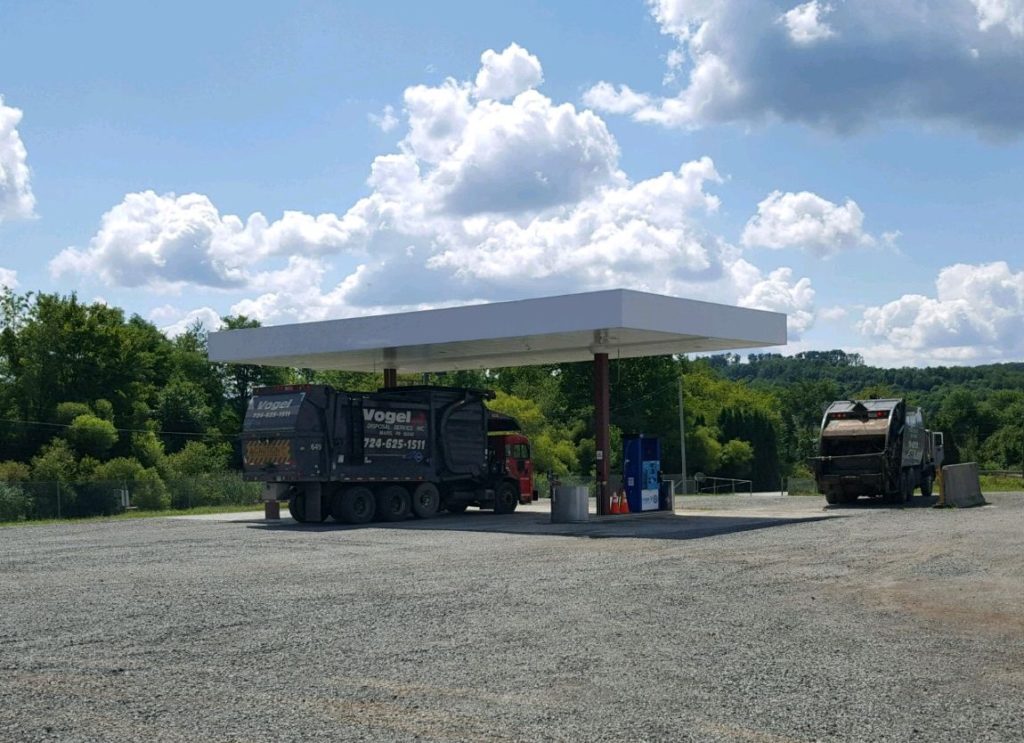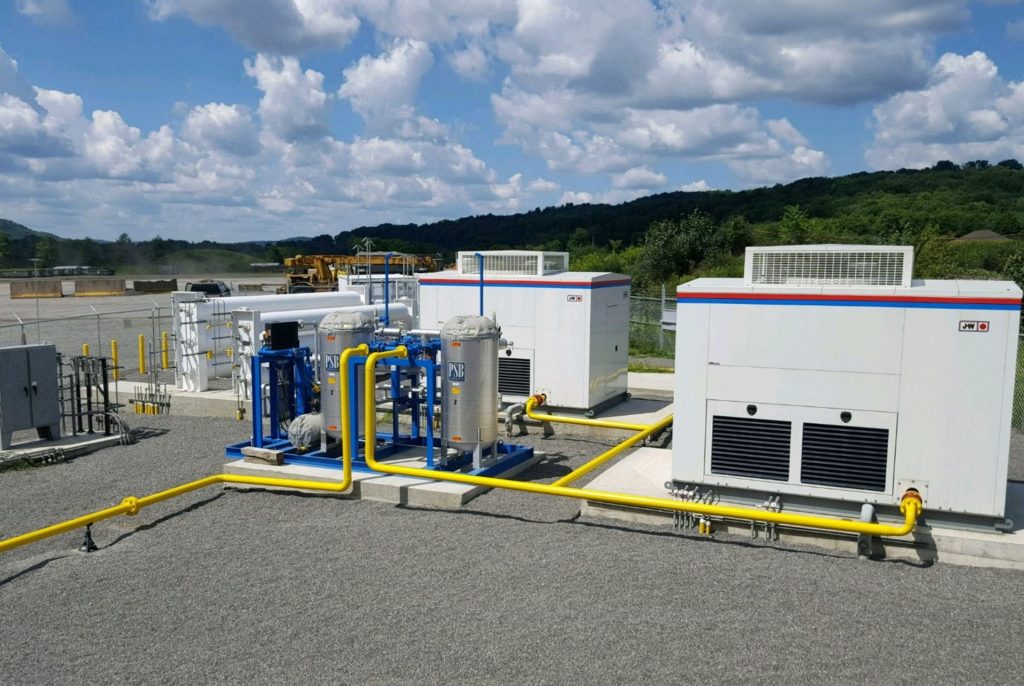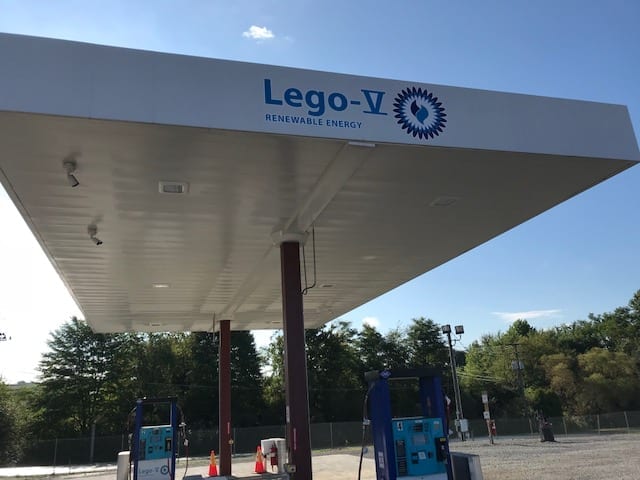An ACT News Executive Interview with Ed Vogel, Vice President, Vogel Holding Inc. and Seneca Landfill, Jackson Township, Pennsylvania
Edward and Margaret Vogel founded Vogel Disposal in 1958 with a single truck, working out of the basement of their house in Mars, Pennsylvania. Sixty years later, the innovative company has grown to become the largest independent provider of waste collection, disposal, and recycling services in Western Pennsylvania. Vogel companies employ more than 600 people, including three generations of Vogel family members (and their dog Gypsy, who has a company named after her!).
Ed Vogel Sr. started the company’s first municipal waste landfill in 1965, the Seneca Landfill in Butler County. More than a decade ago, the Vogel family set out to find a way to utilize the fugitive methane emissions that landfills produce as organic waste decomposes. This led Vogel to become the first company in Pennsylvania to capture the landfill gas they generate and refine it into renewable natural gas (RNG) to fuel their fleet of refuse vehicles that collect the waste that is deposited into the landfill. Compared to diesel, RNG has 27% lower carbon dioxide emissions, 80% lower GHG emissions, and 95% lower NOx emissions.
Vogel is the first company in Pennsylvania to capture the landfill gas they generate, refine it into RNG, then compress it to fuel their fleet of refuse vehicles, which collect waste for deposit in the landfill.
The company calls their new RNG venture Lego-V (pronounced Lego five), creatively named by spelling Vogel backwards. ACT News recently caught up with Ed Vogel Jr. to learn what else his team plans to do with the RNG they are producing.
ACT News: Producing RNG has enabled both Vogel Disposal and Seneca Landfill to reduce their environmental impact and fuel costs. Is the RNG that you are producing being used for anything else?
Ed Vogel: The RNG was actually initially used on-site at Seneca to power operations, and was also injected into the local utility natural gas pipeline for direct use by consumers and local businesses. We’ve used this pipeline since 2011, and we’ll continue delivering RNG in this manner to the utility.
Lego-V opened its first public renewable compressed natural gas (RCNG) fast-fill station in June at the entrance to the Seneca Landfill property. By positioning it on a public access road, it can service our fleet, as well as other local waste haulers, transit bus fleets, goods movement transport trucks, delivery vans, and other fleet vehicles.

Vogel Disposal trucks fueling with RCNG at the Lego-V station located at the Seneca Landfill
Across all the Vogel companies, we want to demonstrate a commitment to sustainability by reducing greenhouse gas emissions and lowering our carbon footprint. It’s simply the right thing to do. Now we also achieve the economic benefit of producing RCNG to fuel our vehicles and sell into the market. It’s a closed loop and a win-win for us.
ACT News: The Lego-V RCNG station is open to the public. Do you think this station will encourage other fleets in the region to convert to natural gas vehicles (NGVs) that can fuel with RCNG?
Ed Vogel: Yes, we’ve been in discussion with both public and private fleets who are interested in fueling at the station. The price of diesel for heavy duty trucks is currently between 50 and 80 cents more per diesel gallon equivalent of RCNG and it’s forecasted to continue to rise. The price of our RCNG won’t fluctuate, so we can predict long-term price stability and pass that along to our customers. Fleets can make long-term plans based on this.
ACT News: Several of Vogel’s 220 refuse trucks and over-the-road transfer haul trucks are NGVs. What are plans to convert more of the fleet to NGVs, and how do you plan to cost-effectively purchase those vehicles?
Ed Vogel: Today we have 35 NGVs in our fleet, with six more on order. We’re pursuing the conversion of the fleet as quickly as we can, as we retire vehicles and need to replace them.
Grant funds we’ve received from Pennsylvania have made it possible for a good project to become a great project. Instead of just sticking a toe in the water, we were able to jump in with both feet.
The Alternative and Clean Energy (ACE) program provided financial assistance in the form of grant and loan funds that helped us build out the gas processing infrastructure for the RCNG station at the Seneca Landfill.
The Alternative Fuels Incentive Grant (AFIG) program is assisting with the construction of two more fueling stations, and with the purchase of more NGVs.
On the fuel side, we are active participants in the Renewable Fuel Standard (RFS) program, using Renewable Identification Numbers (RINs). Without the RINs market, projects like ours would not work.

Natural gas compression and storage equipment onsite at the Lego-V RCNG fueling station
ACT News: Does Vogel have plans to open more Lego-V stations, and will they be open to the public?
Ed Vogel: Under the Lego-V brand, we have two more public fast-fill CNG stations already under way, located at two of our other company operations in Beaver Falls and Grove City. Initially, these CNG stations will be supplied with natural gas from the local utility pipeline. Eventually we plan to take RCNG from the Lego-V station at Seneca and transfer it via a virtual pipeline to these stations.
ACT News: Can you explain what a virtual pipeline is?
Ed Vogel: As we use the term today, we mean the transport of our RCNG by tube trailer, on a truck. This allows RCNG to be transported anywhere a truck can go, without needing a natural gas pipeline to deliver the gas. A virtual pipeline gives markets access to natural gas that aren’t on or near a natural gas pipeline.
ACT News: There are a lot of different components to your LEGO-V venture. Who has helped you navigate the complex project development stages to make this all a reality?
Ed Vogel: InsightFuel has been a key partner throughout the project, and we could not be more pleased with the work they do. Because of their extensive experience and knowledge in the natural gas fueling station and alternative fuel world, they were able to provide a total solution for our project.
InsightFuel is a key partner on the Vogel team, providing extensive experience and knowledge in the natural gas fueling station and alternative fuel world.
The Seneca RCNG station was their first project with us, where they served as the general, mechanical and electrical contractor. They came in under budget and ahead of schedule, so when we committed to move forward with our next two stations, it was an easy decision to partner with InsightFuel.
As we venture into the virtual pipeline portion of our project, InsightFuel will develop a decant panel system and pressure reduction system that enables us to maximize gas delivery and avoid downtime.
InsightFuel has participated in the design, construction, consulting, subcontracting, supplying components, project management, and maintenance of more than 180 major alternative fuel projects. As the Vogel team continues to push the envelope on sustainability, we are grateful to have such a strong project team to help us continue to innovate.


